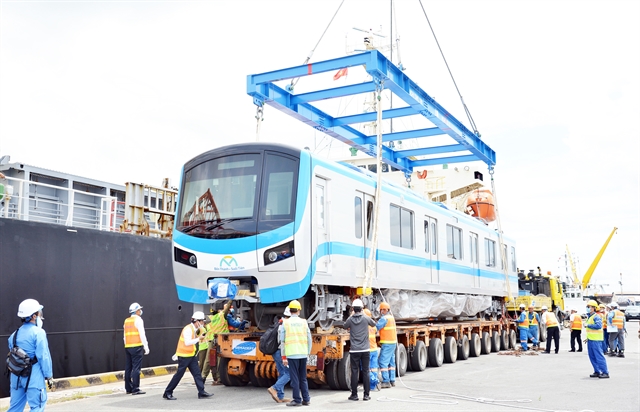 Society
Society

HCM City is seeking foreign investment over the next five years for seven projects, including four metro lines.

|
| A train for HCM City Metro Line No. 1 is received in October last year. The city is planning to call for foreign investment for seven projects, including four metro lines. — VNA Photo Tiến Lực |
HCM CITY — HCM City is seeking foreign investment over the next five years for seven projects, including four metro lines.
The projects include the second phase of the Metro Line No. 2, which covers Bến Thành market to Thủ Đức District’s Thủ Thiêm ward and Tham Lương to Tây Ninh bus station in Củ Chi District.
The second construction phase will be 9.1 kilometres in length and cost around US$1.4 billion. It will help connect the city’s northwestern regions to its centre, as well as connect the Thủ Thiêm railway line to the future Long Thành Airport in Đồng Nai Province.
The second project, Metro Line No. 3A (Bến Thành – Tân Kiên), is 19.5 kilometres long and costs $1.8 billion. It will connect to metro lines at the upcoming Bến Thành Station in District 1 to transport travelers from the city centre to southwest provinces.
The third is Metro Line No.4 (Thạnh Xuân – Hiệp Phước Industrial Park), which is 36.2 kilometres long and costs over $4.5 billion. It will transport locals across the city’s urban areas and Bến Thành.
The last line is the first phase of Metro Line No. 5 (Bảy Hiền intersection – Sài Gòn Bridge), which is nearly 9 kilometres and will cost over $1.7 billion. This line was among the metro lines prioritised for investment in 2012 – 2015 and 2016 – 2020, but was unsuccessful in attracting investment.
For this metro line, the city wants to work with government organisations with official development assistance funds, large corporations, and traffic infrastructure investors that are financially and technologically capable.
Three other projects include Thủ Thiêm financial centre, a centre for conferences, exhibitions, hotel and commercial services, and a Rạch Chiếc Sport Complex, all of which are to be built in Thủ Đức District.
The project proposal is part of a report on national projects to call for FDI, which the city People’s Committee has recently submitted to the Ministry of Planning and Investment.
The city has been facing challenges finding investment in such traffic projects because investors do not see the benefits of investing in the projects or are hesitant to invest because they are all done on a massive scale and require a vast amount of capital.
Regulations on private – public partnership investment in traffic and railway projects still contain some weaknesses, according to the city. — VNS




